Intel’s Tiger Lake 11th Gen Core i7-1185G7 Review and Deep Dive: Baskin’ for the Exotic
by Dr. Ian Cutress & Andrei Frumusanu on September 17, 2020 9:35 AM EST- Posted in
- CPUs
- Intel
- 10nm
- Tiger Lake
- Xe-LP
- Willow Cove
- SuperFin
- 11th Gen
- i7-1185G7
- Tiger King
CPU Performance: Office and Web
Our previous set of ‘office’ benchmarks have often been a mix of science and synthetics, so this time we wanted to keep our office section purely on real world performance.
Agisoft Photoscan 1.3.3: link
Photoscan stays in our benchmark suite from the previous benchmark scripts, but is updated to the 1.3.3 Pro version. As this benchmark has evolved, features such as Speed Shift or XFR on the latest processors come into play as it has many segments in a variable threaded workload.
The concept of Photoscan is about translating many 2D images into a 3D model - so the more detailed the images, and the more you have, the better the final 3D model in both spatial accuracy and texturing accuracy. The algorithm has four stages, with some parts of the stages being single-threaded and others multi-threaded, along with some cache/memory dependency in there as well. For some of the more variable threaded workload, features such as Speed Shift and XFR will be able to take advantage of CPU stalls or downtime, giving sizeable speedups on newer microarchitectures.
For the update to version 1.3.3, the Agisoft software now supports command line operation. Agisoft provided us with a set of new images for this version of the test, and a python script to run it. We’ve modified the script slightly by changing some quality settings for the sake of the benchmark suite length, as well as adjusting how the final timing data is recorded. The python script dumps the results file in the format of our choosing. For our test we obtain the time for each stage of the benchmark, as well as the overall time.
The final result is a table that looks like this:
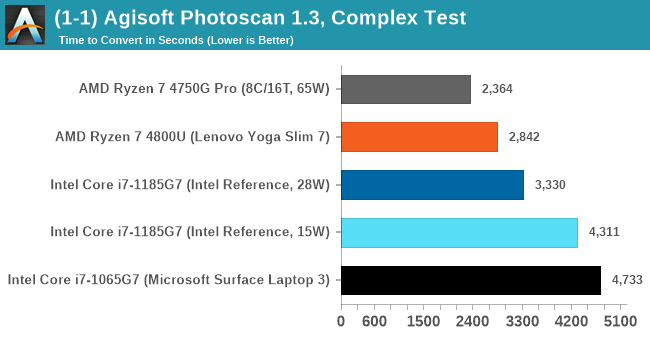
As explained in the power tests, the 4800U with double the cores wins out here, and due to the vector pressure also wins on power efficiency. There’s still a sizeable uplift from Ice Lake to Tiger Lake at 15 W, although 28 W is needed to get something sizeable.
Mozilla Kraken 1.1
Kraken is a 2010 benchmark from Mozilla and does a series of JavaScript tests. These tests are a little more involved than previous tests, looking at artificial intelligence, audio manipulation, image manipulation, json parsing, and cryptographic functions. The benchmark starts with an initial download of data for the audio and imaging, and then runs through 10 times giving a timed result.
Automation involves loading the direct webpage where the test is run and putting it through. All CPUs finish the test in under a couple of minutes, so we put that as the end point and copy the page contents into the clipboard before parsing the result. Each run of the test on most CPUs takes from half-a-second to a few seconds.
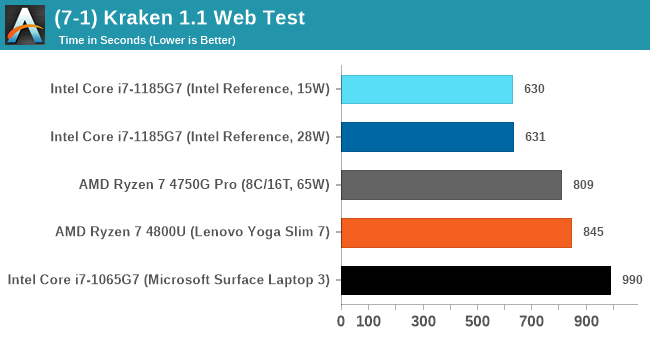
Both the Tiger Lake results are very fast, not showing much difference between the power modes. Intel pushes ahead of AMD here, and ultimately a sizable jump over Ice Lake.
Google Octane 2.0
Our second test is also JavaScript based, but uses a lot more variation of newer JS techniques, such as object-oriented programming, kernel simulation, object creation/destruction, garbage collection, array manipulations, compiler latency and code execution.
Octane was developed after the discontinuation of other tests, with the goal of being more web-like than previous tests. It has been a popular benchmark, making it an obvious target for optimizations in the JavaScript engines. Ultimately it was retired in early 2017 due to this, although it is still widely used as a tool to determine general CPU performance in a number of web tasks.
Octane’s automation is a little different than the others: there is no direct website to go to in order to run the benchmark. The benchmark page is opened, but the user has to navigate to the ‘start’ button or open the console and initiate the JavaScript required to run the test. The test also does not show an obvious end-point, but luckily does try and aim for a fixed time for each processor. This is similar to some of our other tests, that loop around a fixed time before ending. Unfortunately this doesn’t work if the first loop goes beyond that fixed time, as the loop still has to finish. For Octane, we have set it to 75 seconds per run, and we loop the whole test four times.
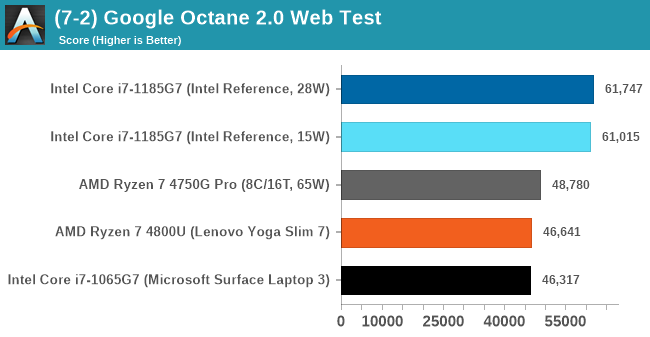
The Tiger Lake system reaches new records in Optane. If there’s anything this system is fast at, it is web workloads.
Speedometer 2: JavaScript Frameworks
Our newest web test is Speedometer 2, which is a test over a series of JavaScript frameworks to do three simple things: built a list, enable each item in the list, and remove the list. All the frameworks implement the same visual cues, but obviously apply them from different coding angles.
Our test goes through the list of frameworks, and produces a final score indicative of ‘rpm’, one of the benchmarks internal metrics. Rather than use the main interface, we go to the admin interface through the about page and manage the results there. It involves saving the webpage when the test is complete and parsing the final result.
We repeat over the benchmark for a dozen loops, taking the average of the last five.
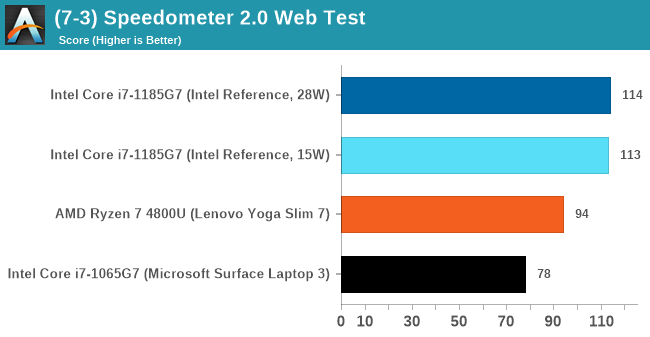
Again, another good win for Tiger Lake.


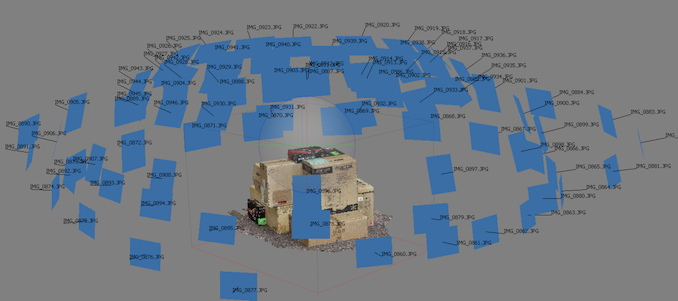
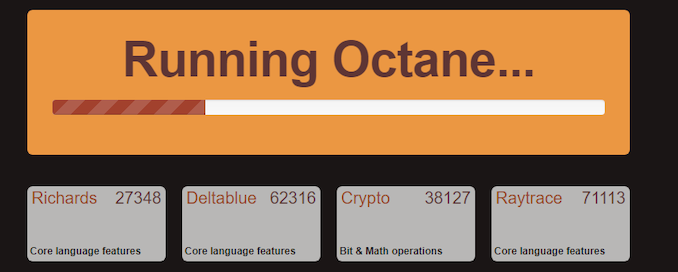
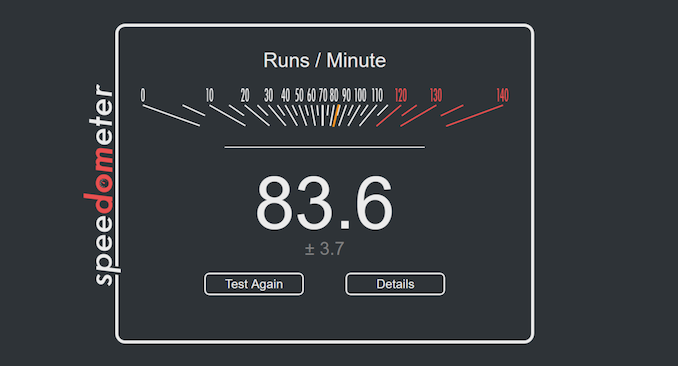








253 Comments
View All Comments
blppt - Friday, September 18, 2020 - link
Yeah, we can extrapolate such things if power consumption and heat dissipation are of no relevance to AMD. You're leaving out other factors that go into building a top line GPU.AnarchoPrimitiv - Saturday, September 26, 2020 - link
Power? It will certainly be better than Ampere which is awful at efficiency... Are you forgetting that RDNA2 will be on an improved 7nm node, meaning a better 7nm node that RDNA2?Spunjji - Friday, September 18, 2020 - link
Big Navi probably won't clock that high for TDP reasons, but the people who are buying that it's only going to have 2080Ti performance are in for a rude surprise. It should compete solidly with the 3080, and I'm betting at a lower TDP. We'll see.blppt - Saturday, September 19, 2020 - link
Its been AMD's modus operandi for a long time now. Introduce new card, and either because of inferior tech (occasionally) or drivers (mostly), it usually ends up matching Nvidia's last gen flagship. Although also at a lower price.Considering the leaked benches we've already seen, Big Navi appears to be more of the same. Around 2080Ti performance, probably at a much lower price, though.
Spunjji - Saturday, September 19, 2020 - link
@blppt - not sure if you're shilling or credulous, but there's no indication that those leaked benchmarks are "Big Navi". Based on the probable specs vs. the known performance of the 3080, it's extremely unlikely that it will significantly underperform the 3080. It's entirely possible that it will perform similarly at lower power levels. They're also specifically holding back the launch to work on software.In other words: assuming AMD will keep doing the same thing over and over when they already stopped doing that (see: RDNA, Zen 2, Renoir) is not a solid bet.
But none of this is relevant here. It's amazing how far shills will go to poison the well in off-topic posts.
blppt - Sunday, September 20, 2020 - link
Considering that the 2080ti itself doesn't "significantly underperform the 3080", Big Navi being in line with the 2080ti doesn't qualify it as getting pummeled by the 3080.blppt - Sunday, September 20, 2020 - link
Oh, and BTW, I am not a shill for Nvidia. I've owned many AMD cards and cpus over the years, and they have been this way for a while. I keep wishing they'll release a true high end card, but they always end up matching Nvidia's previous gen flagship.Witness the disappointing 5700XT in my machine at the moment. Due to AMD's lesser driver team, it often is less consistent in games then my now ancient 1080ti. Even in its ideal situation with well optimized drivers in a game that favors AMD cards, it just barely outperforms that old 1080ti. Most of the time its around 1080 performance.
Actually, YOU are the shill for AMD if you keep denying this is the way they have been for a while.
"In other words: assuming AMD will keep doing the same thing over and over when they already stopped doing that (see: RDNA, Zen 2, Renoir) is not a solid bet."
Except---they STILL don't hit the top of the charts in games on their CPUs. Zen/Zen 2 is a massive improvement, and dominates Intel in anything highly multi-core optimized, but that almost always never applies to games.
So, going to a Zen comparison for what you think Big Navi will do is not a particularly good analogy.
Spunjji - Sunday, September 20, 2020 - link
@blppt - "I'm not the shill, you're the shill, I totally own this product, let me whine about how disappointing it is though, even though performance characteristics were clear from the leaks and it still outperformed them. I bought it to replace a far more expensive card that it doesn't outperform". Okay buddy, sure. Whatever you say. 🙄I didn't say it would take the performance lead. Going for a Zen comparison is exactly what I meant and I stand by it. We will see, until benchmarks come out it's all just talk anyway - just some of it's more obvious nonsense than the rest...
blppt - Sunday, September 20, 2020 - link
@SpunjiThat was the dumbest counter argument I've ever heard.
First off, I didn't buy it to 'replace' anything. The 1080ti is in one of my other boxes. Where did you get 'replace' from? The 5700XT was to complete an all-AMD rig consisting of a 3900X and and AMD video card.
Secondly, the 1080ti is now almost 4 freaking years old. You bet your rear end I'd expect it to outperform a top end card from almost 4 years ago, when it is currently STILL the best gpu AMD offers.
And finally, I have over 20 years experience with both AMD cpus and gpus in various builds of mine, so don't give me that "bought one AMD product and decided they stink" B.S.
I've been on both sides of the aisle. Don't try and tell me i'm a shill for Nvidia. I've spent way too much time and money around AMD systems for that to be true.
AnarchoPrimitiv - Saturday, September 26, 2020 - link
You're a liar, I'm so sick of Nvidia fans lying about owning AMD cards